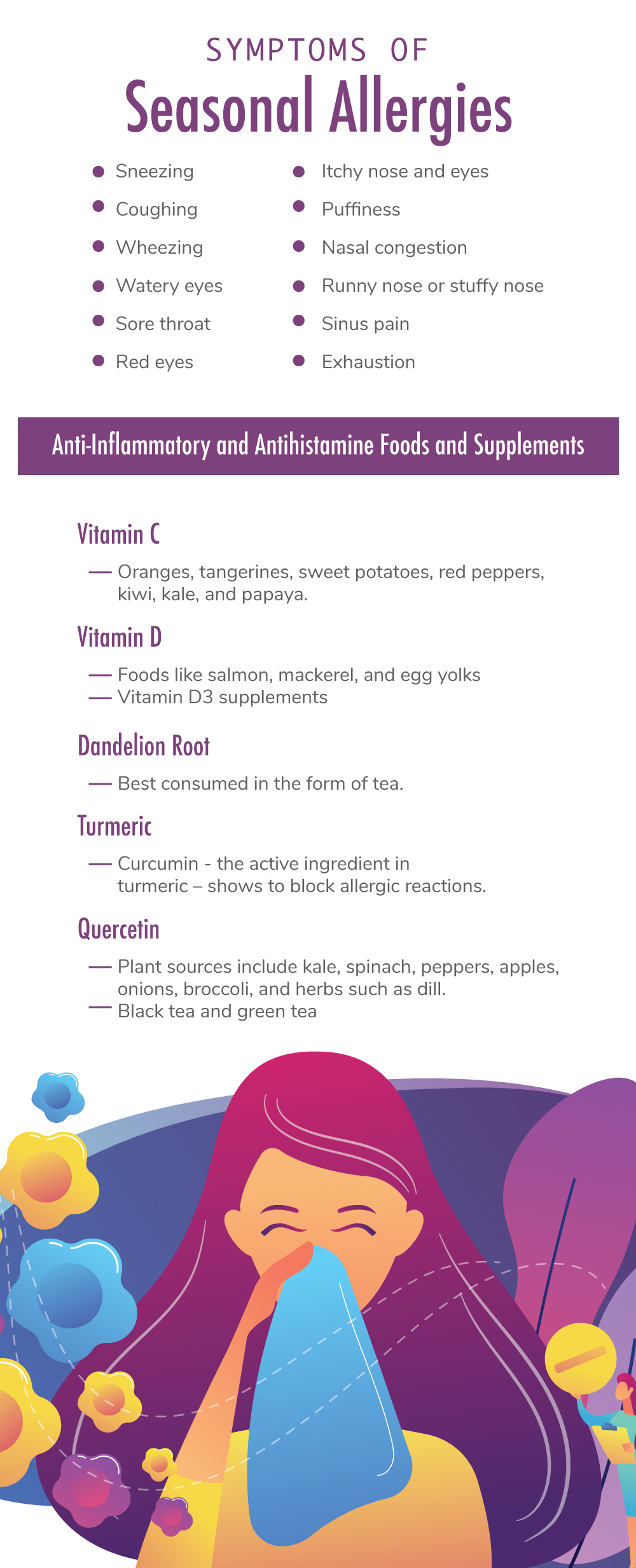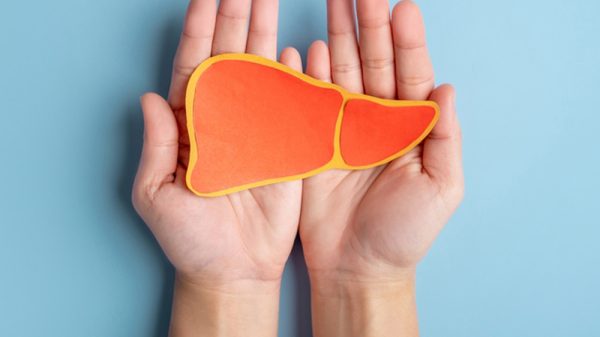Most of us, at some point or another, have experienced the annoying symptoms of seasonal allergies. Allergies are like a cold that won’t go away for the entire duration of the Spring or the Fall season. On top of that, allergies are sometimes resistant to medication, and it can feel like nothing we do is helping, and the only solution is the season change.
So what gives? Does anyone know how to stop allergies immediately? Allergies are a tough condition to beat, and there’s no quick fix. Plus, if you have fatty liver disease, the mechanisms contributing to allergies may be even more complex. Keep reading to find out what you can do to manage seasonal allergies when you have fatty liver disease.
What Are Histamines?
Allergies – also referred to as allergic rhinitis or hay fever – affect a large proportion of the United States, with over 8% of both American children and adults receiving a diagnosis of seasonal allergies in 2015 alone. (1)
Histamines contribute to the unpleasant respiratory symptoms we experience during seasonal allergies. They are the particles that the immune system produces in response to allergens. Histamines are present in certain immune cells like basophils and mast cells and blood levels of histamines increase during an allergic reaction. (2)
Various histamine receptors – labeled respectively as H1R, H2R, H3R, and H4R – are involved in different allergic reactions. Manipulating histamine receptors has clinical implications, and these receptors are often targeted in antihistamine medical interventions. (3)
Histamine release may have varying triggers for different people. For example, while some people release histamines after exposure to pollen, especially when pollen counts are high during the Spring. Others produce histamine in after exposure to ragweed and mold spores.

Symptoms of Seasonal Allergies
Allergy symptoms are unrelenting and often particularly impact the respiratory system. Some allergic reactions are more mild, while severe allergies may encompass nearly all of the following symptoms.
- Sneezing
- Coughing
- Wheezing
- Watery eyes
- Sore throat
- Red eyes
- Itchy nose and eyes
- Puffiness
- Nasal congestion
- Runny nose or stuffy nose
- Sinus pain
- Exhaustion
Inflammation Underlies Allergic Reactions
When you have persisting allergy symptoms, this is a sign that your body is in a state of chronic inflammation. When your body is chronically inflamed, your immune system overreacts to the presence of allergens. Interestingly, the liver plays a vital role in modulating immune response. If the liver isn’t operating at full capacity, as with fatty liver disease, this can disrupt normal immune function and cause inflammatory reactions that make seasonal allergies worse.
Systemic inflammation that plays a role in conditions like fatty liver disease and seasonal allergies may also cause psychiatric symptoms like insomnia, symptoms of depression, and anxiety. (1)
How to Manage Allergies
There are physicians, called allergists, who specialize in allergy responses and allergy treatments. These doctors are specialized in immune response and can evaluate the best course of treatment for your needs. Allergists can administer allergy shots as well as other types of immunotherapies.
Many people reach for the over-the-counter allergy medications that are available in pharmacies and grocery stores. Nasal sprays, eye drops, decongestants can help manage symptoms, while other medications target the histamine reaction directly. A common class of medications used to treat allergic reactions is H1 antagonists. These encompass common over-the-counter medicines like Zyrtec and Claritin. These are effective; however, there is some evidence that H1 antihistamines can potentially exacerbate fatty liver disease. (4)
In other cases, these kinds of medicines do not effectively eliminate symptoms. Let’s take a look at what you to do when allergy medicine doesn’t work or doesn’t fit your specific needs.
Anti-Inflammatory and Antihistamine Foods and Supplements
Addressing systemic inflammation is one of the main ways to tackle the cause of allergies at its core. Many anti-inflammatory agents also exhibit natural antihistamine activity and help improve liver function, with the ultimate outcome of having a streamlined immune response.
Vitamin C
We know vitamin C as a vitamin that fights off colds by strengthening our immune system. It turns out that by strengthening our immune system, vitamin C can also mitigate our histamine reactions to seasonal allergies. You can find vitamin C in fresh produce like oranges, tangerines, sweet potatoes, red peppers, kiwi, kale, and papaya. In a pinch, orange juice provides vitamin C and high-quality supplements work as well.
Vitamin C is critical in supporting numerous biological processes, including cellular, wound healing, ligament growth, and neurotransmitter production. This vitamin also functions as an antioxidant for the liver and mitigates and helps reverse fatty liver disease
Vitamin D
Research shows that vitamin D may play a part in reducing inflammation related to seasonal allergies. (5)
Vitamin D plays a particularly powerful role in immune response, effectively modulating immune activity to prevent autoimmune diseases and inflammatory reactions. Critical immune system players like macrophages, monocytes, T cells, and B cells are regulated by vitamin D. To positively alter the human immune response, vitamin D actually induces epigenetic changes in the DNA in our cells. Vitamin D causes methylation of DNA, meaning it attaches methyl groups to the DNA strand. This, in turn, impacts the expression of our DNA and can result in an immune system that is less sensitive to environmental allergens.
Getting enough vitamin D in our diet can be challenging. Getting adequate sunlight on a daily basis allows our skin to synthesize vitamin D. Additionally, foods like salmon, mackerel, and egg yolks provide vitamin D. In some instances, supplementing with vitamin D3 – the most biologically useful form of vitamin D – may be a good idea.
Dandelion Root
Dandelion root is an excellent way to detox the liver and calm inflammation. Cleansing the liver allows the immune system to operate more smoothly and avoid overreactions to allergens. Dandelion root is best consumed in the form of tea.
There is some debate as to whether someone allergic to dandelion pollen reacts to dandelion root. If you think you may be allergic, always check with your doctor before adding it to your regimen.
Turmeric
Turmeric is a spice that is often used in Indian and Middle Eastern cooking. This spice has a vibrant yellow color and is revered for its therapeutic and anti-inflammatory properties. In particular, turmeric may play a role in improving immune response. Research conducted at the Allergy and Immunology Division in the Department of Pediatrics at the Medical College of Wisconsin in Milwaukee, curcumin – the active ingredient in turmeric – seems to block allergic reactions. (6)
This means that turmeric could have clinical implications for controlling seasonal allergies. To incorporate more turmeric into your diet, sprinkle turmeric on savory dishes like curry.
Furthermore, turmeric has shown the potential to protect liver cells from damage while promoting healing. Turmeric may help reverse fatty liver disease as well as advanced forms of liver disease like fibrosis and cirrhosis.
Quercetin
Quercetin is a flavonol, which is a type of polyphenol found in plant-based foods. Additionally, polyphenols like quercetin are natural antihistamines that quell your immune response to allergens. A study published by researchers in the Czech Republic and Slovakia discusses the potential of quercetin in treating allergies. (7)
You can get quercetin from a variety of plant sources. For example, rich sources of quercetin include kale, spinach, peppers, apples, onions, broccoli, and herbs such as dill. Black tea and green tea are excellent sources of quercetin and other liver-friendly polyphenols that decrease inflammation.
Following a Baseline Anti-Inflammatory Diet
Layering the above supplements on top of a high-fat, high-sugar diet won’t have much of an impact on your reaction to seasonal allergies. First, it’s imperative to wipe your diet clean of inflammatory agents like processed foods and refined carbohydrates.
Processed foods include most things that come in a package. This includes things like chips, cookies, crackers, sugary cereals, cheese, packaged meat, fried foods, and fast food. These foods tend to be filled with saturated fats, which contribute to high cholesterol and lead to the accumulation of plaque within the arteries. Too much plaque can form a blockage, which can cut off blood and oxygen supply to organs, leading to tissue death and cardiovascular events like heart attacks and strokes. Sodium is another culprit in these foods, which raises blood pressure and contributes to cardiovascular disease. Refined grains like white bread and white rice and quickly metabolized in your body and lead to a dramatic rise in blood sugar levels, which over time causes insulin resistance. All of these factors exacerbate conditions like fatty liver disease, metabolic syndrome, gallstones, cardiovascular disease, and even seasonal. The commonality underlying all of these conditions is systemic inflammation.
Replace unhealthy, artery-clogging foods with fresh, whole foods. This includes lots of vegetables, fruits, whole grains, nuts, seeds, and beans; and smaller quantities of lean meat, fish, and low-fat dairy. While fruits and vegetables contain antioxidants, lean meats, nuts, seeds, and beans contain protein and essential amino acids that fortify the immune system.
Getting Tested for Specific Allergies
Your doctor can help you determine exactly what you are allergic to by performing allergy tests. If you are aware of your specific allergy triggers, this can guide your efforts for avoiding certain plants or preparing for the onset of a certain season.
Allergy-Proofing Your Home
In addition to improving liver function and following an anti-inflammatory and antihistamine diet, there are steps you can take to minimize the particles that you breathe in when you’re at home. Allergy-proofing your home will lower your exposure to allergens that set off your immune system.
For example, air purifiers can provide constant filtration to remove indoor allergens like dust mites, chemicals, pollutants, pollen, mold, pet dander, and other irritants from indoor air. Replacing the air conditioning filters regularly is a good idea as well, to prevent the constant circulation of trapped particles. To prevent the buildup of allergens, regularly clean and dust surfaces, and check for mold growth.
Even if taking these precautions doesn’t necessarily remove the specific allergen that you are sensitive to, it will eliminate extraneous irritants so that your immune system is not as taxed. Dealing with two allergens is better than dealing with dozens.
Conclusion
Allergies, though incredibly common, are also an indicator of chronic inflammation. Your immune system is overly activated and is responding excessively to environmental pathogens. If your liver function is affected by fatty liver disease, this further compromises your immune system’s ability to respond effectively and appropriately to certain pathogens. In order to fight both fatty liver disease and seasonal allergies, follow an anti-inflammatory diet plan while incorporating healing vitamins, herbs, and supplements into your diet. Healing your liver and fighting chronic inflammation will ultimately help your immune system handle allergens more effectively.
References:
(1) https://www.ncbi.nlm.nih.gov/books/NBK493173/
(2) https://www.ncbi.nlm.nih.gov/pubmed/1699987
(3) https://www.frontiersin.org/articles/10.3389/fimmu.2018.01873/full
(4) https://www.ncbi.nlm.nih.gov/pmc/articles/PMC4101675/
(5)https://www.ncbi.nlm.nih.gov/pmc/articles/PMC5410413/























